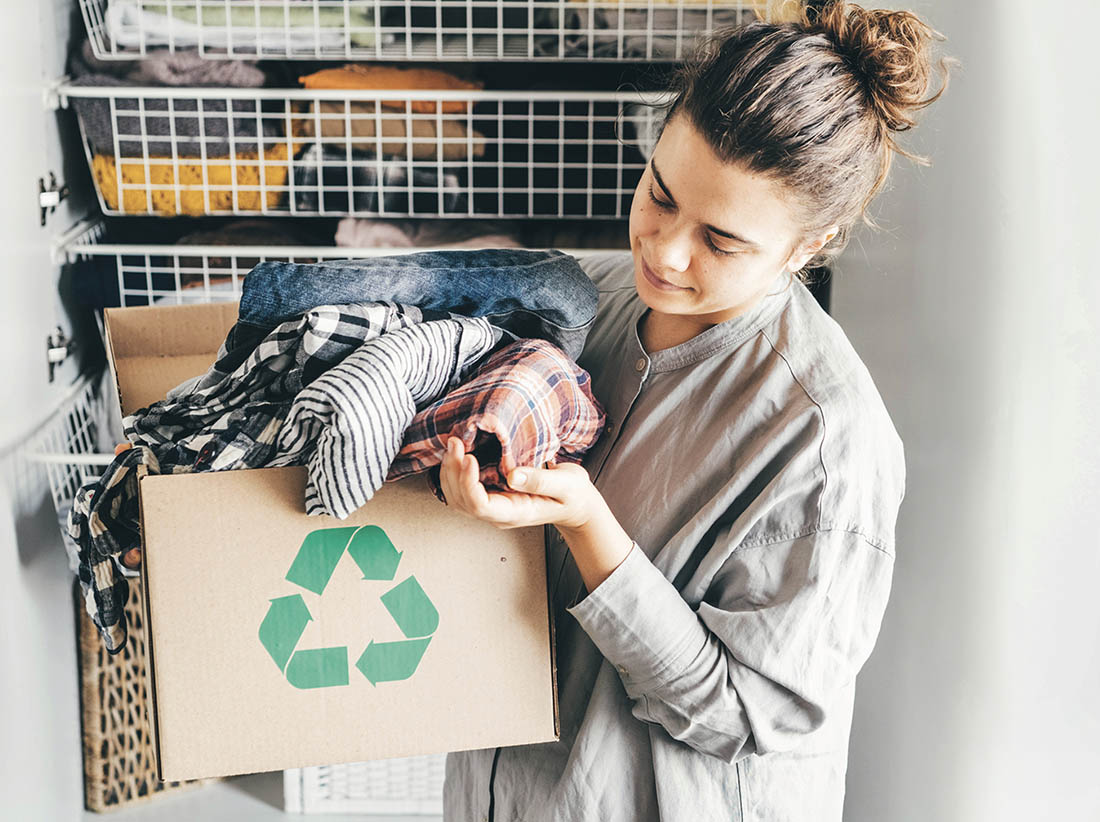France Points to the Future for the European Union and Recycling
It’s no accident that there is currently so much activity related to recycling textile waste and the production of regenerated fibers currently being announced in France.
The country has had an Extended Producer Responsibility (EPR) scheme for waste clothing, household linen and footwear (CHF) in operation since 2008, under which manufacturers pay annual fees for its collection and sorting.
The European Commission’s Textiles Strategy is mandating the separate collection of waste CHF Europe-wide from 2025, so it’s interesting to note what progress has been made in France to date.
The first thing to say is that the scheme is extremely complex, with so many companies and institutions involved, so many factors that have to be taken into account and the complicated calculations that are necessary, and in many cases have to be approximated.
There are, for instance, now 47,406 voluntary CHF drop-off points which are being overseen by 583 local authorities across France, and 67 separate sorting companies with differing technologies involved in dealing with the waste as part of the EPR scheme.
Meanwhile, 6,087 participating manufacturing companies made declarations to the scheme in 2022, with 4,354 registered as putting less than 5,000 items on the market and 1,733 companies who produced more than 5,000.
Management
Paris-headquartered Refashion was created solely to manage the scheme and is accredited by the French authorities and governed by 29 manufacturers and brands, and three industry federations.
In the last clear indication of the annual cost of the scheme to industry, Refashion reports that in 2021 some 4,351 companies paid in €71.44 per ton of waste, based on an estimated 715,290 tons of CHF put on the market, which equates to fees of over €51 million. The scheme is currently undergoing a change in methodology which shows 2022 as a “blank” year in terms of fees declared, as readjustments to accounting are made.
It would be also in the interest of transparency if those 29 brands and manufacturers governing the scheme – who include major names like C&A, Decathlon and LVMH (owner of Louis Vuitton and Dior) – included their own annual production figures in tonnage or items placed on the market within Refashion’s annual reporting, as examples for others to follow. There’s so much talk about the need for transparency from brands right now, but the majority are reluctant to disclose how much they actually produce each year.
Collection
In 2022, however, Refashion calculated that 3.3 billion items of CHF were placed on the French market in 2022, representing an estimated volume of 826,935 tons.
Collection in 2022 was 260,403 tons and 187,609 tons was successfully sorted – the objective is to collect 300,000 tons per year, and sort all of it.
In 2022, 59.5% of the quantities collected and sorted were considered to be reusable. Less than 10% of these items will be sold in France and add to the quantities of clothing and footwear sent for redeployment before sorting. It is estimated that between 10,000 and 30,000 tons per year of CHF are redeployed mainly in outlets run by charities. The remainder are exported to other countries, primarily in Asia and Africa, with Pakistan and Tunisia the leading destinations.
The challenge in the years to come remains to optimize the reuse rate within France and Europe.
Refashion carried out audits of 53 of its members responsible for putting some 566 million items of CHF on the market during 2022.
Eco-Modulation
In 2023, Refashion’s plan involves overseeing a total fund of almost €93 million, with €39 million going to the funding of sorting, local authority initiatives and R&D activities, €15 million on repair and redeployment of the waste CHF and most interestingly, over $13 million in the payment of so-called “eco-modulation” bonuses.
Specifically, products incorporating raw materials from the recycling of post-consumer CHF waste collected or funded by an approved organization qualify for a bonus of €1,000 per ton, and those made from recycled mill waste a bonus of €500 per ton – significant concessions when considering the huge volumes that can be involved.
Incentives
In short, this is further incentivizing the use of recycled fibers by making it economically advantageous, and in parallel with other support measures from the French government, is resulting in some very major initiatives.
Two of the biggest involve chemical companies supplying the raw materials for the production of synthetic fibers, and specifically PET polyester.
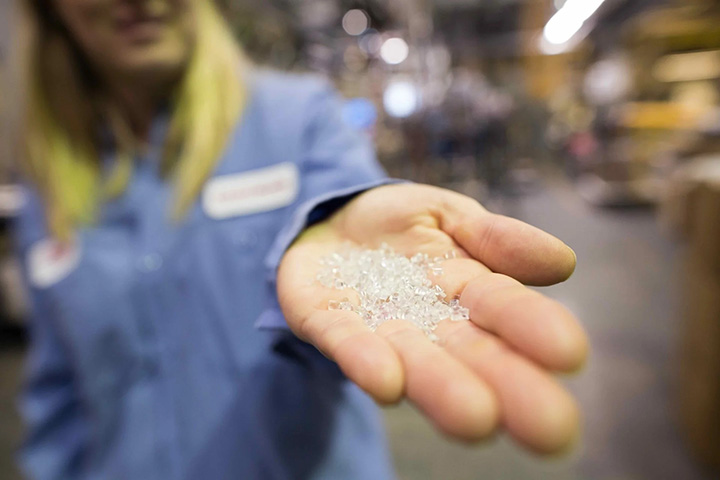
In January 2022, French President Emmanuel Macron and Mark Costa, CEO of Eastman, jointly announced a plan to invest up to $1 billion in a material-to-material molecular recycling facility in Port-Jérôme-sur-Seine, in Normandy, France. It will use Eastman’s polyester renewal technology to recycle up to 160,000 metric tons of waste annually and is scheduled to become operational by 2025.
The multi-phase project includes units that will prepare mixed plastic waste for processing, a methanolysis unit to depolymerize the waste, and polymer lines to create a variety of first-quality materials for both packaging and textile applications.
Eastman’s polyester renewal technology promises to retain the value of materials almost infinitely, by keeping them in production, lifecycle after lifecycle. With the technology’s inherent efficiencies and the renewable energy sources available in France, materials can also be produced with greenhouse gas emissions of up to 80% less than traditional methods.
Loop Technology
Paris-headquartered water solutions leader Suez is meanwhile partnering with SK Geo Centric (SKGC), a subsidiary of the South Korean chemicals giant SK Group, to establish a €450 million PET plastic and fiber recycling plant in Saint-Avold, based on the technology of Loop Industries.
With commissioning also planned for 2025, the facility will manufacture 100% recycled and infinitely recyclable virgin-quality PET resin with a planned capacity of 70,000 tons per year.
Loop Industries, headquartered in Montreal, Canada, owns patented and proprietary technology that can depolymerize PET plastic and polyester fiber waste currently of little or no value, including packaging, carpets and textiles of any color, transparency or condition, and even ocean plastics that have been degraded by the sun and salt. The resulting monomers are filtered, purified and polymerized to create virgin-quality Infinite Loop-branded PET resin suitable for use in both food-grade packaging and polyester fibers. The monomers can be recycled infinitely without degradation of quality, it is claimed.
This project will follow on from the first Infinite Loop manufacturing facility which is being built in Ulsan, South Korea, and will also have an annual capacity of 70,000 tons.
Enzymatic Recycling
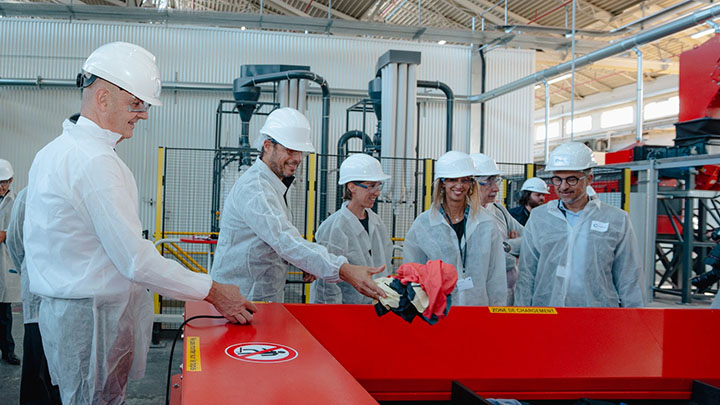
Carbios and PET plastics and fiber leader Indorama Ventures are partnering to build an enzymatic PET bio-recycling production plant in Longlaville, Meurthe-et-Moselle, France, with a processing capacity of around 50,000 tons of post-consumer PET waste per year – the equivalent to 2 billion PET bottles or 2.5 billion PET trays.
The capital investment required for the project is expected to be around €150 million for the Carbios core technology, with an estimated €50 million for the infrastructure preparation of the site.
Carbios has received strong financial support from the French Government and from the Grand-Est Region for the project.
Carbios is a pioneer in the development of enzymatic solutions dedicated to the end-of-life of plastic and textile polymers and fibers and has already successfully started-up a demonstration plant in Clermont-Ferrand.
Preparation for Recycling
At the beginning of October this year, Carbios inaugurated its textile preparation for recycling line at the Clermont-Ferrand site, in the presence of French Minister for Industry, Roland Lescure.
To streamline the textile preparation phase, which is currently carried out by hand or on several lines, Carbios has developed a fully integrated and automated line that transforms textile waste from used garments or cutting scraps into the raw material suitable for depolymerization with its enzymatic biorecycling process.
This patented line integrates all preparation stages including shredding and the extraction of hard materials such as buttons or fasteners and provides Carbios with a high-performance, scalable development tool.
The capacity of the new line is 300kg per hour in a continuous process.
Mechanical Recycling
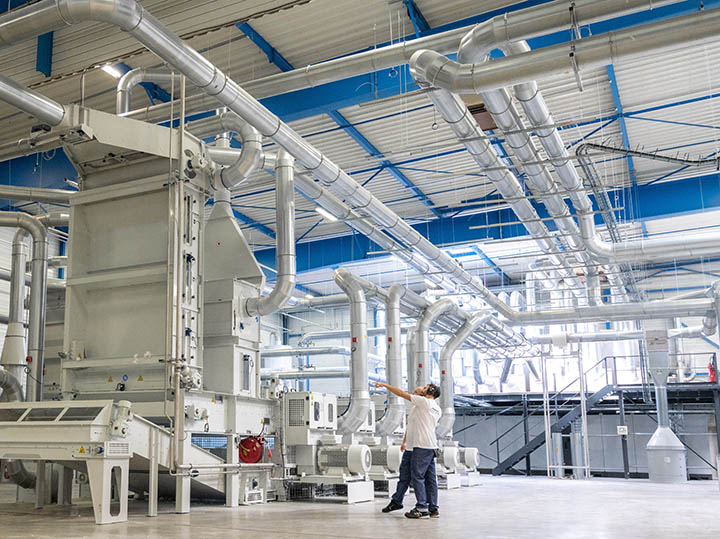
With the acquisition of Laroche, based in Cours La Ville, France, at the end of 2020, the Graz, Austria-headquartered Andritz Group became a leader in the field of mechanical fiber recycling.
Laroche has specialized in fiber recycling lines for both spinning and nonwovens for just short of 100 years and the acquisition complements the leading position of Andritz in nonwovens technology.
Andritz Laroche has been involved in a number of new French recycling projects, including Renaissance Textile, established by workwear specialists Klopman and TDV Industries, which aims to localize a circular supply chain for workwear fabrics in Europe – currently 85% dependent on non-European countries.
Unlocking the potential of automatic sorting in order to accommodate more recycled fibers is the aim of another project in which Andritz is partnering with companies Pellenc ST and Synergies TLC. The three companies are setting up a new industrial-scale business called Nouvelles Fibres Textiles, combining Pellenc ST’s automated sorting technologies with Andritz recycling machines.
Pellenc ST has installed more than 2,000 machines globally, including those for sorting fibrous materials such as paper, as well as plastics.
“Nouvelles Fibres Textiles will process post-consumer textile waste to produce recycled fibers engineered for the spinning, nonwovens and composites industries,” said Andritz product manager Elina Peronen. “It will serve as a production line and also as an R&D line for the three partners, as well as a test and demonstration center for customers.”
CETIA
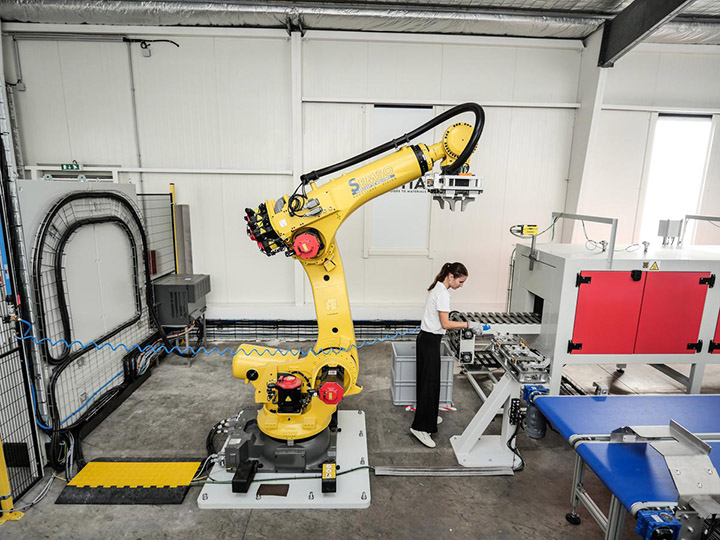
This September also saw the inauguration of CETIA, a new center dedicated to textile recycling in Hendaye in the south of France, as a subsidiary of research organizations CETI and ESTIA
Leveraging automation, robotics and artificial intelligence, its aim is to build efficient systems to make recycling operations competitive.
Its work will involve prototyping concepts with the aim of removing technological barriers and establishing their technical feasibility on an industrial scale, developing pilot lines and launching pre-production runs. It will further transfer core competence and skills for the implementation of solutions at customer sites.
The 1,200-square-metre CETIA site at Hendaye is equipped with a Valvan Fibersort machine for sorting waste textiles by both composition and color into ten separate bins, using NIR and RGB technologies, with a throughput of a garment each second.
Two openers and a cleaning willow supplied by Dell’Orco and Villani, with a capacity of 600kg per hour, are further in place for the separation of fibers and trims from waste garments.
A proprietary system for the separation and sorting of shoes is also being developed as part of the Re-Shoes project, using robotics to remove glued, sewn, injected or vulcanized soles at a rate of 120 shoes per hour to date.
Brands support
CETIA is supported by a number of brands, including Decathlon and Zalando, and has received €900,000 from Refashion to fund projects, along with almost €1m million from the Nouvelle-Aquitaine region.
It may have taken a while, but all things considered, it looks like France is now setting the pace in establishing a fiber-to-fiber ecosystem for other nations to follow.


